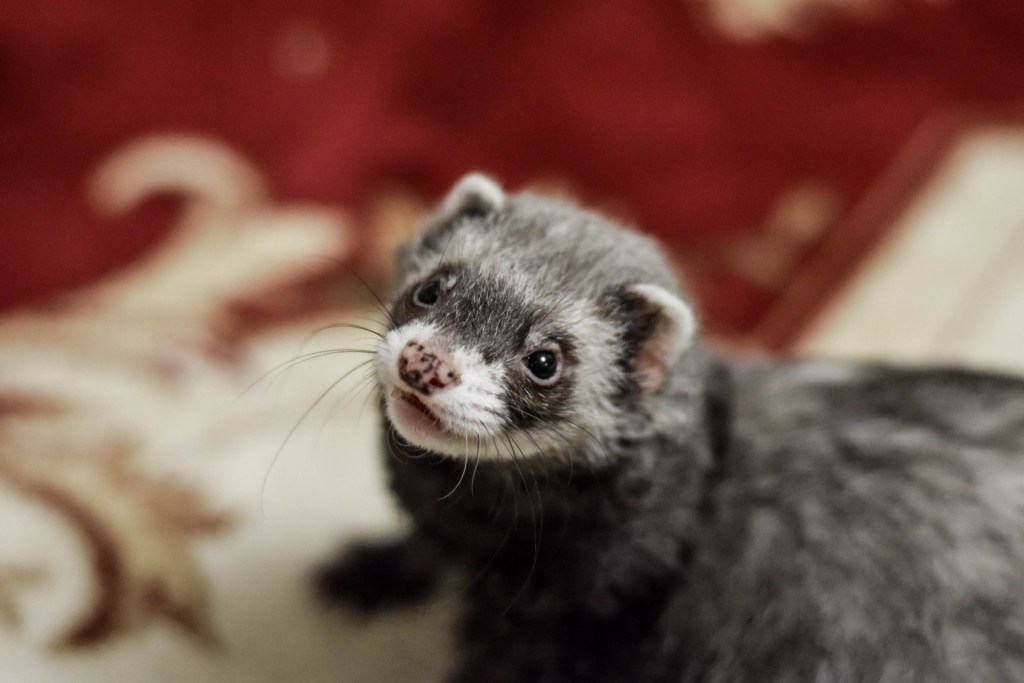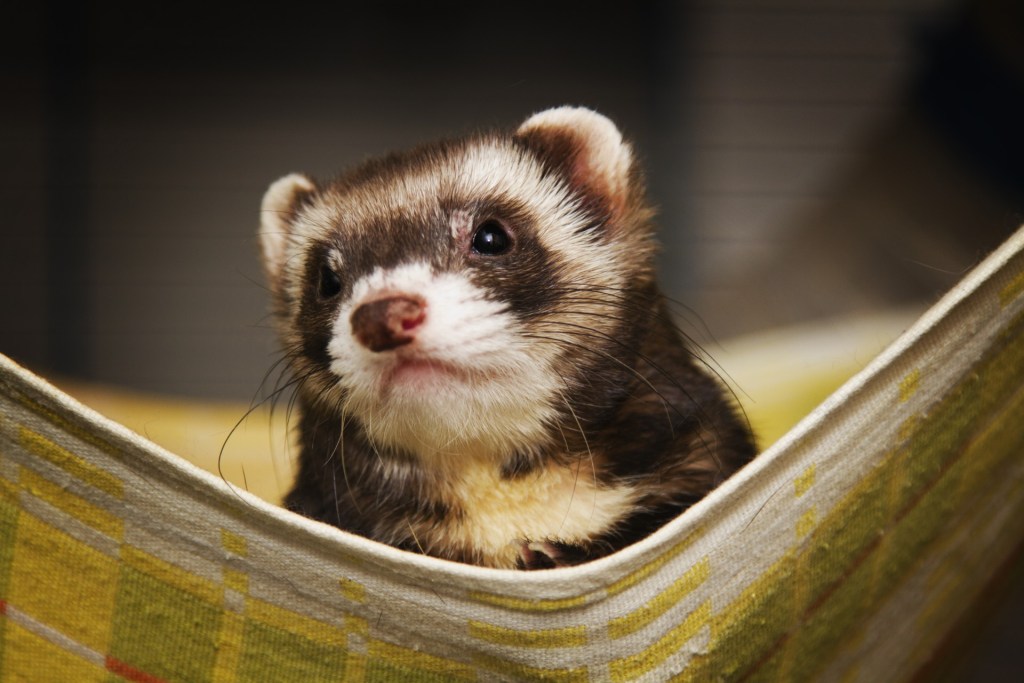Ferrets are one of the cutest pets you can have. They are curious and social. They are active. Moreover, litter training a ferret is completely possible. Often compared to a dog because of their love of people and playful personality, they are furry and love to cuddle. These mischievous little animals are super fun to watch and have very active lives. They sleep most of the day but are ready to party at dawn and in the evening hours. Let’s learn the most important basic facts about having a pet ferret.
Ferret basics

Ferrets are members of the Mustela genus, where the weasel is the most well-known species. They can grow up to 20 inches long and live for about a decade. They were domesticated about 2,500 years ago and used to hunt rabbits by earlier cultures. The origin of their name is Latin for “little thief” — the perfect way to describe the curious nature of these amazing animals.
They have a very fast metabolism, which means they eat several times a day. Their strict carnivore diet is high in fats and protein, which results in a beautiful coat that sheds twice a year. Ferrets can benefit from grooming but are known to be very clean pets.
Ferrets as pets
These incredible animals love attention and will play for hours with their toys and owners. They can be trained to respond to their names and even perform simple tricks. They are incredibly intelligent and will try to explore their surroundings. Known as little escape artists, ferrets should be kept in a ferret-proof cage with plenty of space, a hard floor, and a secure door. Provide a dark and warm environment for them to sleep, and make sure they spend at least six hours of playtime outside of their cage every day.
Ferrets do best with a companion. If you’re considering adopting one of these sweet creatures, you might want to adopt a friend for them. A word of caution: If you have small children at home, please wait until they’re older than five before adopting a ferret. Ferrets are delicate, and they can easily be injured by younger children who lack the coordination necessary to handle them with care.
Another important thing to know about ferrets? They’re toothy. Ferrets have thick skin, so they can bite each other without causing any harm. Humans, on the other hand, can find themselves in a world of hurt if they don’t properly train their ferret not to bite. They’re most likely to bite if they feel frightened, but the vast majority of ferrets tend to stop biting once they warm up to their owners.
Ferrets always need to be supervised to protect them from chewing on and swallowing solid matter that might create a blockage in their digestive system. There are many toys available that are safe and challenging for them.
Ferret temperament
Ferrets are most active at dawn and dusk, and they sleep anywhere from 18 to 20 hours a day. When they’re awake, they’re wide awake and ready to play. Ferrets love to run around, and they’ll play with anything and everything within reach. If your ferret bares her teeth, don’t worry. She doesn’t want to bite you; she’s actually inviting you to join in on the fun.
How to house a ferret
Your ferret cage needs to be at least 24 by 24 by 18 inches and have plenty of ventilation. The name “ferret” comes from the Latin furittus, which means “little thief.” Natural escape artists, ferrets need to be housed in cages that lock securely and don’t have any potential escape routes. We recommend wire cages; cages with wooden floors will become soaked in urine and stink up the entire house.
Ferrets shouldn’t spend all their time in their cage. They need a few hours of playtime with their owner each day, but you’ll need to ferret-proof your house. Make sure these curious critters can’t wriggle behind appliances like refrigerators, ovens, dishwashers, or your washer and dryer. You’ll also need to ensure they can’t get their little paws — and mouths — on anything made of foam or rubber. A ferret will eat your dog’s squeaky toy in a heartbeat, which could result in a gastrointestinal obstruction.
What to put in the cage with your ferret
Because ferrets are naturally playful, they’ll probably tip over their food and water bowls at some point. We recommend lining their cage with old towels, blankets, or castoff clothes. Not only does recycling old clothes and towels create a warm and cozy environment for your ferret, but soft bedding also absorbs spilled water and prevents it from soaking your floor. You also could look for food and water bowls that attach to the side of their cage.
You’ll also want to provide your ferret with toys. Cardboard boxes, hard plastic toys they can’t chew through, and PVC pipes are all wonderful options that will keep your ferret entertained for hours on end.
Did you know ferrets can be trained to use a litter box? Keep an eye on your ferret to learn where she urinates and defecates most often, and then place a litter box in her favorite corner.
What to feed a ferret
As a ferret pet owner, you will be feeding them a lot of meat. They are not the best at digesting raw meat, but there are special formulas available with a high content of fat and protein and all the other nutrients they need to thrive. If you want to go the natural way, try a diet based on eggs, cold water fish, and minced meat. Avoid vegetables and fibers since their digestive system is not built to process that type of food. Stay away from sugars or dairy products and provide plenty of fresh water daily.
Grooming
These friendly animals are great at keeping themselves clean. They use a bowl of water in their cage to wash their face and clean the rest of their fur just like a cat. They need very few baths. Pet owners who bathe ferrets too often can cause their skin to produce more natural oil, which makes them smell more than if you let them naturally groom themselves. You can clean them with a baby wipe and let them swim in water without soap. Regular nail clipping is needed as well.
Veterinary care and common diseases
Ferrets need at least an annual checkup by a vet for preventative measures. Due to extreme inbreeding, they suffer from certain diseases that can be managed if detected early enough. They also are constantly eating objects that hurt their digestive system. The main medical problems to look for are adrenal gland disease and insulinoma, a type of pancreas cancer common at old age.
Preventive care
- This list details the main preventive care needed to keep your ferret in good health:
- Annual vaccinations to prevent rabies
- Annual fecal examination for parasites
- Eradication of ear mites
- Year-round flea and heartworm prevention
- Regular dental cleaning
- Blood tests and tracking of glucose levels
- Microchip application for tracking and loss prevention
Regulations
Ferrets are not legal as pets in all of the U.S., and you must make sure you are getting your pet from a reputable breeder. The following states have made it illegal to own a ferret:
- California
- Hawaii
- Washington, D.C.
- New York City
For more information, visit The American Ferret Association for the latest information and legal implications of regulation.
Becoming a ferret parent is a great adventure full of fun times and will fill you and your family with amazing memories. With the right mindset and time investment, you will develop a loving bond with your pet.



